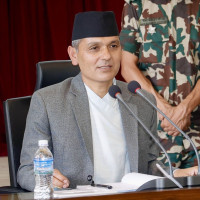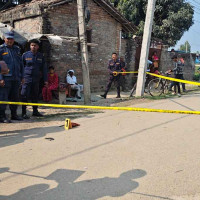- Friday, 20 February 2026
BP Memorial Day
The Great Leader’s Affection
BP Koirala was a towering personality in the global political sphere and second to none in the modern history of Nepal. A true nationalist, the late Koirala not only continuously pleaded for democracy but also struggled for the well-being of the Nepalis until he breathed his last. This scribe was fortunate to have had the opportunity to listen to the great leader in person on several occasions. I met him for the first time in the early seventies, when he was living in Sarnath, Varanasi, India. He was in self-exile and chose to stay in Sarnath across the Ganges in the old religious city of Varanasi. Many Nepali Congress leaders and party workers from across Nepal used to visit him.
From Sarnath, he had called the Nepali people to be united for an armed revolution to topple the authoritarian Panchayat system imposed by late king Mahendra at the gunpoint of his military force and reinstate democracy. He believed that democracy was indispensable for national unity and the well-being of the nation. I heard people talking about him from my childhood. I became a staunch follower of his political teachings in the later days of my school life. I developed myself as an activist to pursue his ideas realised in the practical field during my college days, and I became the target of the local administration in Ilam. A warrant was issued against me, which compelled me to cross the border and reach Koirala.
Handsome personality
I was thrilled to find a tall but thin ever ever-smiling, very handsome personality with piercingly sparkling eyes in front of me in one evening. I saluted him enthusiastically, uttering ‘Jaya Nepal.’ He was kind enough to respond graciously with the same resound. I was there from Naxalbari in West Bengal, along with late Girija Prasad Koirala (GP) and late Nona Koirala. I was a bit hesitant to have dinner on the same dining table together with such high-profile persons that evening.
The next morning, Koirala gestured for me to follow him up to the open top of the Sarnath house. We sat down on the chairs face to face. He asked me if I wanted to talk to him. Of course, I had many queries to make, which I passed to him one by one and got the replies. I felt relieved and informed at the end of about two-hour one-to-one talk. Such conversations, mainly his propositions on contemporary issues, lasted for another two consecutive fine mornings.
Later, I was assigned to establish a camp (a place to live together temporarily for the exiled workers) in the Naxalbari area and run it. Some five to 10 leaders and party workers stayed there. It was difficult to manage the camp with little money provided by the party. So I was always under pressure. I was just approaching my 20s and did not have any past experience. This adverse situation resulted in the deterioration of my health. I grew physically weaker and mentally depressed. Some visiting fellows of the organisation might have reported my case to Koirala.
GP Koirala used to visit the Naxalbari camp regularly in a gap of not more than three months. In one of his visits, he told me that Sandaju (BP) had asked me to join him. I reached Sarnath with GP. The next morning, BP gestured for me to follow him. His car stopped on the premises of Banaras Hindu University Medical College Hospital. I followed him straight to Dr. Bajpeyee's chamber. Bajpeayee was the chief of the department of medicine. Koirala asked Dr. Bajpayee to check my health. I was diagnosed with Hepatitis and given an Ayurvedic medicine and advised to rest.
I stayed at Koirala's Sarnath residence for a month. In addition to a normal meal, I was given a cup of milk both times. I spent my time reading books given by BP. Every evening, I walked to the Sarnath temple park, and sometimes stayed gossiping with the young monks to whom I had developed a warm friendship. I was recovering fast. One afternoon of the third week of my stay there, BP invited me to his room on the first floor. He handed me two fistfuls of coins in my clenched hands and told me that he would be out for a couple of days, and I should have a liter of milk every day with that money till he returned. I came down and checked the coins to find them valued ten, twenty, twenty-five and fifty paisa each. Some five-six coins were valued at one rupee each.
Financial thrift
But he did not go anywhere as he had told me. The next morning, GP came back from his travel, and BP left Sarnath only that afternoon. Later, I came to know that GP was out to manage some money for BP’s travel. He could not get back in time, so his travel was delayed by a day. Only then did I realise that BP did not have paper currency to give me the other day. So the coins were used. This is how BP took care of his friends and followers. BP was very strict on financial matters. So, when he assigned anyone for marketing, s/he had to be sincere to give him back even the loose change. Thus, he always had a reserve of coins.
Today, it has been 43 years since we lost BP Koirala. Although a multi-party democratic system was restored in Nepal seven years after BP Koirala passed away, and the country became a federal republic in 2008. However, Nepal has not yet realised the dream BP had about Nepal and Nepali people then. Maybe, our leaders did not abide by the political ideologies and principles shown by BP and failed to steer the country ahead on the path of progress with social justice as envisaged by the great leader. While observing the 43rd BP Memorial Day, we need to be ready to make a full retrospective of our past policies and dare to make corrections so that the dreams of the great leader can be realised.
(Gautam, a former NC leader, is now a freelance journalist.)














